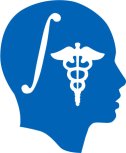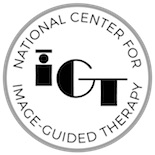SFN2009 Slicer DTI Workshop

| ||

|

|

|
Contents
Mapping the Brain with Diffusion Tensor Imaging - A Hands-On Workshop by the National Alliance for Medical Imaging Computing (NA-MIC)
Friday October 16th, 2009
8:30 AM - 5:00 PM
Satellite Workshop Goals
- To educate attendees in the fundamentals of Diffusion Tensor Imaging (DTI) data required to make informed decisions about how to analyze their own DTI data.
- To provide tutorials on DTI data validation and management (including how to put your image data into NRRD format).
- To provide hands on tutorials in the use of NA-MIC DTI analysis tools.
- To establish contact between NA-MIC Tookit experts (users and developers) and basic and clinical researchers in the global neuroimaging community.
Workshop Logistics
- Private Dining Room #2; Hilton Chicago, SFN Co-headquarter hotel. 720 S. Michigan Avenue.
- Enrollment is limited to approximately 45-50 attendees due to the highly interactive format of the workshop.
- The material is targeted for an audience of graduate students, research fellows, junior faculty, research assistants and post-doctoral trainees from among the fields of clinical neuroscience (Psychiatry, Psychology, Neurology) as well as Radiology, and Computer Science.
Registration
- To register, send an e-mail to Katie Mastrogiacomo (kmast at bwh.harvard.edu). Please include your contact information including full spelling of your name, degree, current institution, preferred email address for communication, your educational background and training and your reason for attending. We would also appreciate it if you would indicate the characteristics of the computer you will be using for the workshop (OS, RAM, Processor).
- A deposit is required to hold your place in the workshop. Please mail a check or money order for $50.00 US made out to "Brigham and Women's Hospital, NA-MIC project" to Katie Mastrogiacomo; SPL, Radiology, ASBI, L1-050; Brigham and Women's Hospital; 75 Francis St.; Boston, MA 02115.
- Your deposit will be returned to you at the Workshop. If you are unable to attend after registering and give us 48 hours advance notice, your deposit will be returned, otherwise you will forfeit this earnest money.
- Questions about logistics should be addressed to to Katie Mastrogiacomo (kmast at bwh.harvard.edu, or 617-732-7389). Questions about content of the Workshop should be addressed to Randy Gollub (rgollub at partners.org).
- This Workshop is supported by the National Alliance for Medical Image Computing (NAMIC), funded by the National Institutes of Health through the NIH Roadmap for Medical Research, Grant U54 EB005149. Information on the National Centers for Biomedical Computing can be obtained from http://nihroadmap.nih.gov/bioinformatics.
Workshop Faculty
- Martin Styner, PhD, University of North Carolina Chapel Hill
- Guido Gerig, PhD, University of Utah
- Randy Gollub, MD, PhD, Harvard Medical School (Department of Psychiatry and Martinos Center, Department of Radiology, Massachussets General Hospital)
- Anastasia Yendiki, PhD, Harvard Medical School (Martinos Center, Department of Radiology, Massachussets General Hospital)
- Sonia Pujol, PhD, Harvard Medical School (Surgical Planning Laboratory, Department of Radiology, Brigham and Women's Hospital)
- Katie Hayes, MSE, Harvard Medical School (Surgical Planning Laboratory, Department of Radiology, Brigham and Women's Hospital)
Preparation for Workshop -- Important Information for all attendees
Suggested background reading for workshop:
- Le Bihan D, Mangin JF, Poupon C, et al. Diffusion tensor imaging:. concepts and applications. J Magn Reson Imaging 2001;13:534–546 [pdf download]
- Westin CF, Maier SE, Mamata H, Nabavi A, Jolesz FA, Kikinis R., Processing and Visualization for Diffusion Tensor MRI. Medical Image Analysis, 6(2)::93-108, June 2002 [pdf dowload]
- S. Mori and P.C.M. van Zijl, Fiber tracking: principles and strategies – a technical review. NMR in Biomedicine, 15(7-8):468-480, 2002 [pdf download]
- Mukherjee P, Berman JI, Chung SW, Hess CP, Henry RG. Diffusion tensor MR imaging and fiber tractography: theoretic underpinnings. AJNR American journal of neuroradiology (2008) vol. 29 (4) pp. 632-41
- Mukherjee P, Chung SW, Berman JI, Hess CP, Henry RG. Diffusion tensor MR imaging and fiber tractography: technical considerations. AJNR American journal of neuroradiology (2008) vol. 29 (5) pp. 843-52
This is hands-on training. All participants must come with their own computer and install the software and data at the links below. Windows XP, Linux or MacOS 10.4 or greater computers are supported. A minimum of 1 GB of RAM (2 GB if possible) and a dedicated graphic accelerator with 64mb of on board graphic memory are required.
Please complete the following items prior to the workshop.
- Software Installation Please install the newest Slicer3.4 Stable release from May 2009 appropriate to the computer you will be bringing to the workshop:
- Windows: Slicer3-3.4-2009-05-21-win32.exe
- Mac OSX Darwin PPC: Slicer3-3.4.2009-05-21-darwin-ppc.tar.gz
- Mac OSX Darwin Intel: Slicer3-3.4.2009-05-21-darwin-x86.tar.gz
- Linux x86: Slicer3-3.4.2009-05-21-linux-x86.tar.gz
- Linux x86-64: Slicer3-3.4.2009-05-21-linux-x86_64.tar.gz
Note: Mac OSX Darwin PPC users may also need to download this additional script.
- Download Data Please install the 3D Visualization dataset and the Diffusion tutorial dataset.
We will be happy to assist anybody who may encounter difficulties in the installation process. As first point of contact, send an email to the NAMIC-developers mailing list which is closely monitored by NA-MIC Tookit experts. Because we will focus on how to use the application(s) during the workshop not on how to install it, please do the install before you arrive. Most people find that the installation can be completed without difficulties. If you need any hands on assistance after making attempts to complete this on your own with email support, please arrive early (8:00 AM).
Agenda
8:30 AM - 5 PM
- 8:30 - 8:40 AM Goals of Workshop (Randy Gollub)
- 8:40 - 9:30 AM Mathematical and physical foundations of DTI (Anastasia Yendiki)
- 9:30 - 10:15 AM Getting to Know DTI really, really well- tensors, glyphs and more (Guido Gerig)
- 10:15 -10:30 Coffee Break
- 10:30 - 11:45 AM DTI: what it is, how it is used in for research and clinical practice and its future potential (Martin Styner)
- 11:45 - 1:15 Lunch on own
- 1:15 - 1:45 DTI Tractography Validation(Sonia Pujol)
- 1:45 - 3:00 Hands-on Session 1- Intro to Slicer and NA-MIC DTI tools part 1 (Sonia Pujol/Randy Gollub/Katie Hayes) Slicer3 and NA-MIC kit, 3D Visualization
- 3:00 - 3:15 Coffee Break
- 3:15 - 4:30 Hands-on Session 2- Slicer and NA-MIC DTI tools part 2 (Sonia Pujol/Randy Gollub/Katie Hayes) Diffusion MRI Tutorial
- 4:30 - 4:40 Ongoing NA-MIC Development Activities (Martin Styner)
- 4:40 - 4:50 Multi-site DTI Acquisition- Lessons from BIRN (Randy Gollub) Note that the DTI acquisition page is being curated, check back later for full access. Until then, here is some of the extracted information to assist you.
- 4:50 - 5:00 Users feedback - input from participants about this Workshop
To learn more about the NA-MIC Toolkit
Please visit our Wiki page for general information and the NA-MIC Kit pages for specific information.